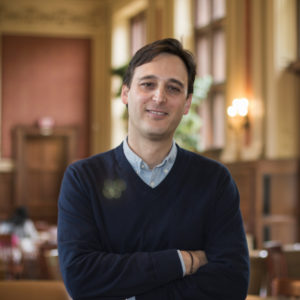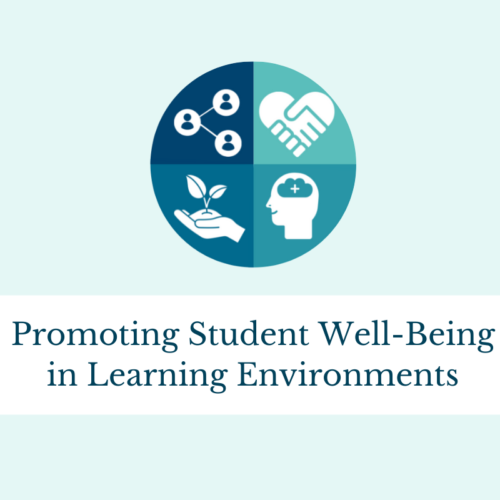Faculty Spotlight with Ignacio Infante, Associate Professor of Comparative Literature and Spanish and Associate Director of the Center for the Humanities
 “There is nothing like discovering a new key passage or moment in a literary work together with all the students in the class. It is precisely those moments of shared discovery and unique collaboration that make teaching in both comparative literature and Spanish at WashU such a uniquely rewarding experience,” said Ignacio Infante, Associate Professor of Comparative Literature and Spanish and Associate Director of the Center for the Humanities at Washington University in St. Louis. Professor Infante has taught courses including “World Literature” and “Culture in Crisis,” as well as graduate seminars such as “Theory and Practice of Literary Translation II” and “Poetics and Politics in Democratic Spain.”
“There is nothing like discovering a new key passage or moment in a literary work together with all the students in the class. It is precisely those moments of shared discovery and unique collaboration that make teaching in both comparative literature and Spanish at WashU such a uniquely rewarding experience,” said Ignacio Infante, Associate Professor of Comparative Literature and Spanish and Associate Director of the Center for the Humanities at Washington University in St. Louis. Professor Infante has taught courses including “World Literature” and “Culture in Crisis,” as well as graduate seminars such as “Theory and Practice of Literary Translation II” and “Poetics and Politics in Democratic Spain.”
Professor Infante joined the College of Arts & Sciences at Washington University in 2009. Prior to his current role, he was a doctoral student at Rutgers University, where he earned his PhD in Comparative Literature on a Fulbright Scholarship. Professor Infante’s dissertation was entitled “Poetics of Transfer: Translation, Cosmopolitanism and the Intermedial in 20th-century Transatlantic Poetry.”
Professor Infante has been the recipient of many academic grants and honors including a 2016 Literary Translation Fellowship from the National Endowment for the Arts (awarded for his co-translation with Michael Leong of Vicente Huidobro’s Temblor de cielo), as well as a Getty Library Research Grant.
In 2020, Professor Infante was an honoree of the Emerson Excellence in Teaching Award, which recognizes educators for their leadership in and passion for teaching, their contributions to student learning, and their knowledge and creativity.
In an interview with The Center for Teaching and Learning, Professor Infante discussed his path toward becoming a professor of comparative literature and Spanish. He also emphasized the importance of helping students build writing, editing and critical thinking skills to examine the complexities of today’s world.
What was your path toward becoming a professor of comparative literature and Spanish?
I was born in Granada, a city in Spain with a complex, fascinating multicultural past, and a vibrant cultural life in the 1980s, and I always had a passion for literature as a way of connecting with different worlds. Public libraries were part of the life of the city then, and there was a fascination with foreign comic books among my main group of friends growing up (Titin, Asterix, various Marvel and DC comic book imports from the US, as well as Japanese manga). Also, my mother was a high school English teacher, so I was able to learn English at an early age, as well as travel to the UK as part of her professional training first, and, eventually, join some of the language immersion trips that she organized for her students.
After a couple of years at the University of Granada, I obtained a grant to study at Trinity College Dublin, Ireland, where I eventually transferred, completing my undergraduate studies in English literature, as well Spanish and Portuguese literatures in 2001. It was in Dublin—a city permeating a passion for literature, theater, and music everywhere that I was able to immerse myself for more than four years in the study of literature, not just in English, but also to learn more about the practice of literary translation. During my years in Dublin, I was living across languages and in translation all the time, and that experience-simultaneously personal and scholarly-soon became my passion. Through a few other crucial steps along the way, (most importantly working as a literary translator for what is now Penguin Random House in Barcelona, studying for a year at UC Irvine, and then receiving a Fulbright Scholarship to complete my doctoral studies in comparative literature at Rutgers University), those years led to where I am today.
How did you become interested in modern poetry and modernist and avant-garde poetics?
Prior to moving to Dublin, my study of poetry had been based on a ‘national literary history’ model that essentially entailed the study of canonical poets rarely going past the 18th century, and memorizing a range of versification patterns and rhyme schemes. While at Trinity, I was able to discover poetry as a brand-new experience: as an open flow of language and images that was alive, and that I was able to connect, through my study of modern and avant-garde poetics, to the fields of philosophy, history, aesthetics, critical theory, and the arts. I see poetry as being not just related to poetics and rhetoric, but also closely related to other academic fields and forms of knowledge. I was also able to discover poetry as a space for encountering new voices, identities, and cultures, not just within the space of the page, but also in readings, performances, and art shows happening across the city of Dublin. Studying under superb scholars and teachers of poetry who were able to transmit their passion for modern poetry was definitely key. It was through my teachers at Trinity that I discovered some of my favorite poets, then and now: Maya Angelou, John Ashbery, Anne Carson, Emily Dickinson, Seamus Heaney, Langston Hughes, Gertrude Stein, to name a few. In fact, it was after studying English-language poetry that I was able to re-discover the work of amazing Spanish-language poets, such as Federico García Lorca, Juan Gelman, Cristina Peri Rossi, or Alejandra Pizarnik, poets whose work was for various reasons unavailable to me earlier in life. The fact that I get to teach some of the writers that I first discovered more than 25 years ago here at WashU still feels as humbling and exciting as the first day I encountered the work of all of my favorite poets!
What is your favorite part (or parts) of teaching comparative literature and Spanish?
There is nothing like discovering a new key passage or moment in a literary work together with all the students in the class. It is precisely those moments of shared discovery and unique collaboration that make teaching in both comparative literature and Spanish at WashU such a uniquely rewarding experience. Another favorite part is to see students really expanding their ideas and analysis through the writing process. I take their own writing to be the best culmination of all our readings, discussions, presentations, and creative reflections on the materials explored in class, and it is incredibly exciting when students embrace the challenge and take their own engagement with the course to the next level through their own writing.
How have you adapted your teaching during the pandemic? What advice do you have for other instructors teaching during this challenging time?
Definitely a lot of Zoom (and my more recent discovery of the great potential of Padlet to start a conversation)! Also, structuring the course materials on different modules on Canvas took me a while to learn, but I think it can work great as a way of conceiving a course over the semester and adding various dimensions to the learning process. In terms of advice, I would definitely encourage colleagues to reach out to the Center for Teaching and Learning with any questions, as well as participating in the many CTL workshops on various digital tools and best practices available. I would like to thank the CTL for all of their support provided last summer so that so many of us could get our courses ready to go in different formats during the pandemic.
What do you hope students take away from your classes?
My teaching emphasizes what I take to be the uniqueness of humanistic inquiry at a time in which the humanities have shown their invaluable power to respond in so many crucial ways to a moment of such a deep, painful crisis for so many. I really encourage all of my students, departing from their own perspectives and identities, to develop a range of essential learning goals: to think critically about literary texts and cultural works across various cultures, time periods and languages; to examine and evaluate how different historical forces shape key concepts in order to understand our world today; to discuss, expand, and share ideas related to content explored in my courses; and to develop superior analytical, writing, and research skills-both in English and Spanish. Building upon essential practices such as close reading, careful editing, and argumentation can definitely assert one’s unique vision, while critically understanding the complexities of our world at the same time. Ultimately, I strive to provide a learning space where all students can feel safe while questioning received assumptions-a space in which generalities, labels, and stereotypes can be identified, interrogated, and respectfully challenged, while new ideas, interpretations, and hypotheses can be proposed, created, and refined through collaboration and supportive teamwork.



